 Expert's opinion
Expert's opinion
Expert's opinion
The article is a subjective view on this topic written by writers specializing in medical writing.
It may reflect on a personal journey surrounding struggles with an illness or medical condition, involve product comparisons, diet considerations, or other health-related opinions.
Although the view is entirely that of the writer, it is based on academic experiences and scientific research they have conducted; it is fact-checked by a team of degreed medical experts, and validated by sources attached to the article.
The numbers in parenthesis (1,2,3) will take you to clickable links to related scientific papers.
10 Foods To Avoid To Lose Belly Fat 2024

Due to factors like genetics, diet, stress, and the health of your gut microbiome, keeping a trim waistline and flat belly can be difficult. However, you can find increased success if you change your diet and use a fat burner.
Ensuring that you consume various nutritious foods is essential to maintaining a healthy weight, as certain foods will help your body hold onto belly fat more than others. Learn what foods to avoid when trying to lose belly fat and achieve your weight loss goal.
What Are Foods To Avoid When Losing Belly Fat?
If you wish to lose belly fat and maintain a more desirable, lean figure, you will want to avoid certain foods. Unfortunately, specific foods will contribute to fat hanging around your waistline and belly, triggering health problems. Make an effort to eat less of the following foods to avoid weight gain, flatten your beer gut, and feel healthier.
- Fried Foods
- Fast Foods
- Refined Grains And Cereals
- Foods With Transfats
- Pasta And Carbs
- Deli Meat
- Breakfast Pastries
- Cheese And Other Dairy
- Foods High In Sugar
- Foods High In Sodium
What Foods To Avoid To Maintain A Flat Belly?
Before you pick up your fork or fill up your plate, learn what foods to avoid to lose belly fat. Foods containing healthy fats, complex carbs, and soluble fiber can contribute to weight loss and flattening out a beer belly. However, the following foods may support increased weight gain[1], metabolic syndrome diseases, and a prominent belly.
Fried Foods
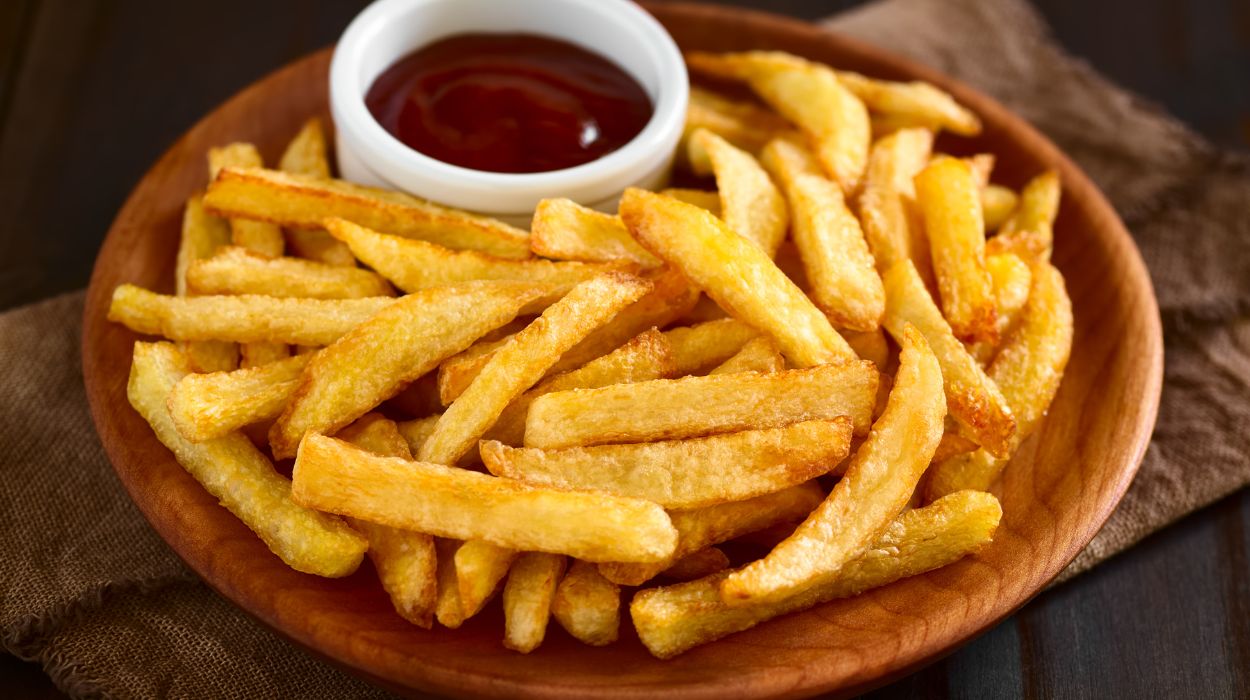
Certain oils should be avoided for frying foods, like corn, sunflower, and canola oil because of saturated and polyunsaturated fat levels. And, some fried foods are simply a recipe for disaster for your midsection. When possible, seek alternative ways to cook foods without resorting to frying them in heavy oils. Try to bake, saute, or steam meats, vegetables, and snacks.
Fast Foods
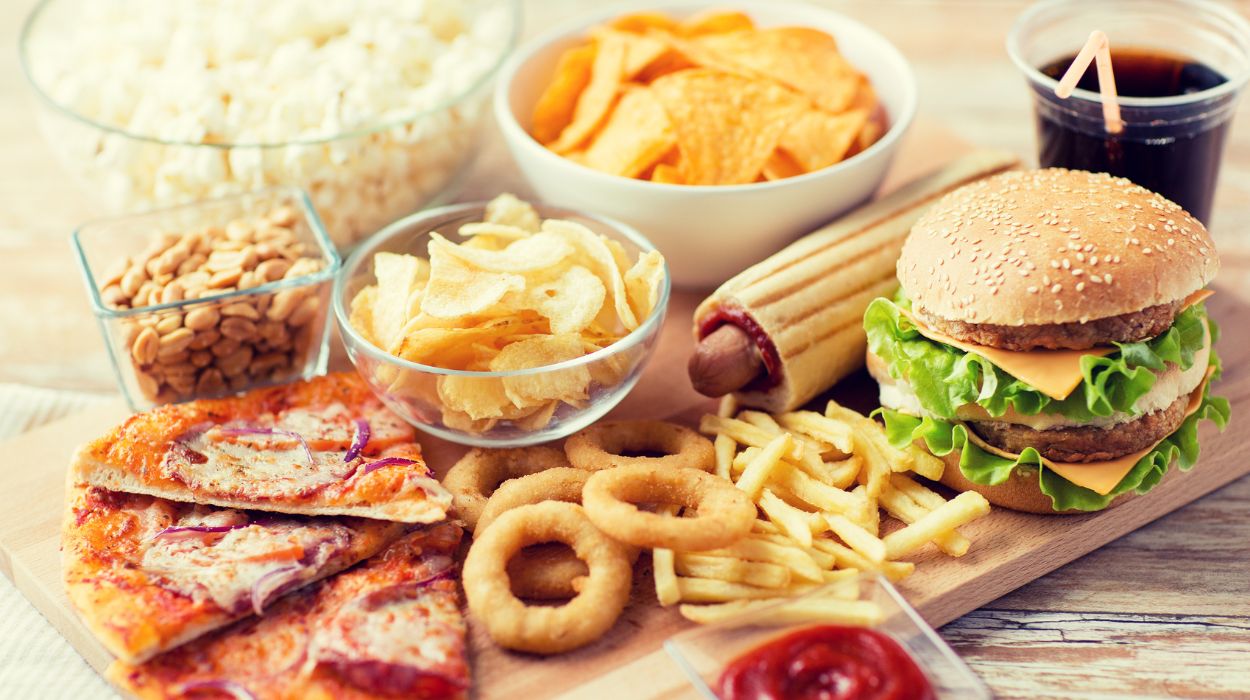
The fast pace of modern life may make fast food look like a convenient option for breakfast, lunch, or dinner, but it is at a steep cost to your health. Many fast foods are highly processed, contain excessive sugar, salt, fat, and contribute to a larger waistline and beer belly.
Refined Grains And Cereals
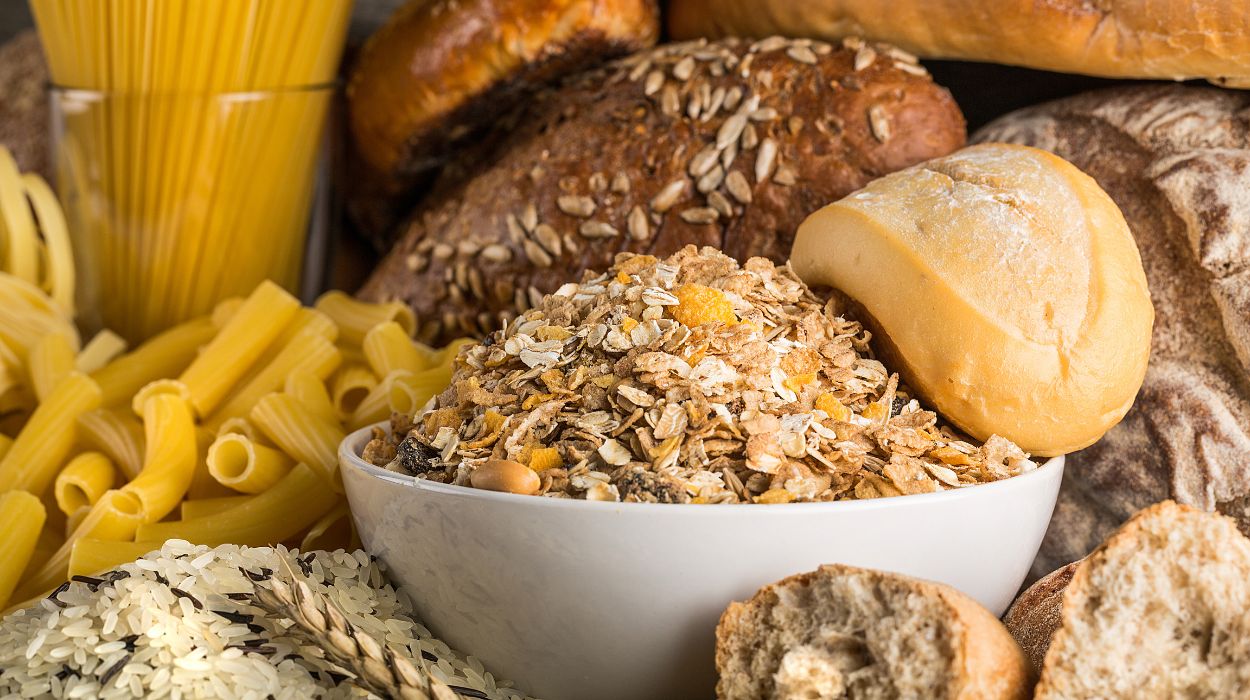
Unlike whole grains that are not stripped of nutrients, refined cereals, white rice, white bread, and similar foods create more belly fat. Refined foods increase obesity risk and belly fat because they are digested quickly, are low in fiber, and create extreme fluctuations in blood sugar. Try to eat more whole grains like quinoa, whole-wheat pasta, barley, and oatmeal.
Foods With Trans Fat
Although most foods that include trans fat have been banned, some items still linger and can lead to belly fat. Avoid foods containing margarine and vegetable shortenings. Foods with transfats include certain frostings, microwave popcorn, refrigerated dough, baked goods, fried foods, and microwave popcorn. Before you eat, read the ingredients.
Pasta And Simple Carbs
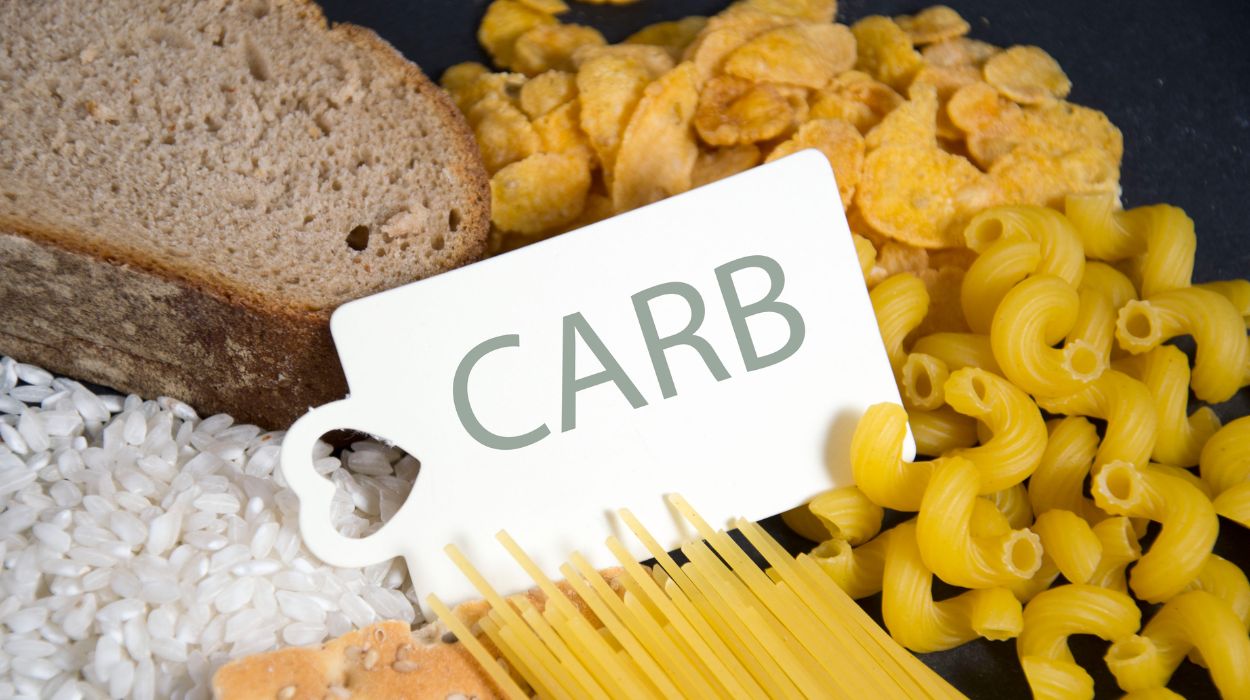
A bowl full of spaghetti, linguini, or a heaping plate of lasagna may look appetizing, but it might be extending your waistline and contributing to a beer belly. It is vital to eat a diet with more fiber than relying on refined carbs like pasta to stay fuller longer. Complex carbs can help trigger weight loss and a flatter belly, but refined pasta can help you pack on the pounds.
Deli Meat

Stop and think before putting that delicious-looking hero or sub sandwich in your mouth. Processed foods such as salami, bacon, and sausage are connected to an increased waistline, body mass index, and belly fat.
Many processed deli meats can increase the risk of certain cancers and heart disease. Because certain meats contain a high level of saturated fat, it contributes to visceral fat on the abdomen, poor digestion, and unwanted weight gain.
Breakfast Pastries
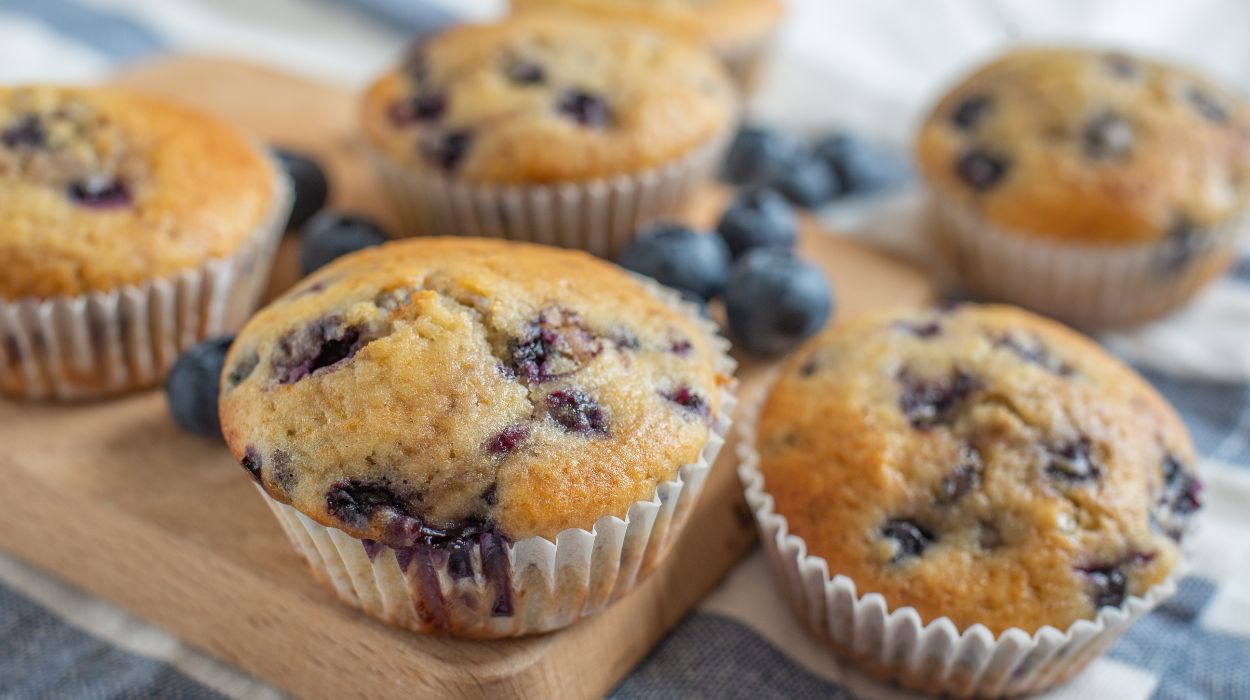
Avoid eating baked goods that are prepackaged and chock full of ingredients that help your body hold onto belly fat. Even freshly prepared breakfast pastries can be a problem for your midsection and encourage belly fat.
Many breakfast muffins, scones, and danishes are laden with refined flour, trans fats, and sugar and are low in nutritional value but high in calories. Even granola is more of a sweet treat than a healthy option. Switch out sweet baked goods for breakfast and replace them with eggs, natural fiber-rich berries, and lean protein.
Cheese And Other Dairy
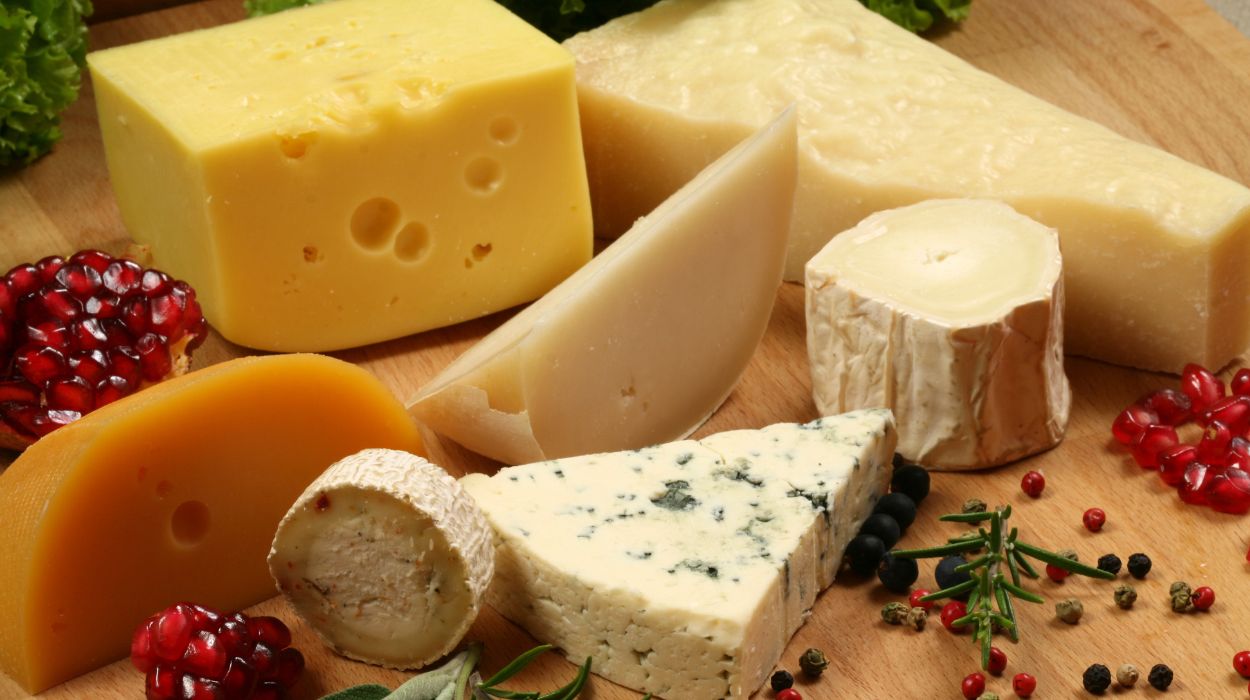
In some cases, studies show that consuming dairy can be beneficial to your metabolism. However, if stubborn belly fat is a problem, you may want to steer clear of cheese and other dairy products and opt for alternatives instead.
Cheese, yogurt, milk, and other dairy products can lead to inflammation and create an imbalanced gut microbiome. High-fat foods like cheese can also encourage fat around your midsection, belly, and other areas.
Foods High In Sugar
When binge drinking or overeating, one tends to reach for foods high in sugar. Foods with a high amount of fructose contribute to fat buildup around the liver and belly. Avoid soft drinks, alcohol in excess, dried fruits, candies, jams, canned fruit, desserts, condiments with added sugar, and energy drinks.
Foods High In Sodium
There is a connection between consuming high amounts of sodium and an increased risk of belly fat and obesity. Unfortunately, excessive sodium can lead to increased water retention and swelling.
Additionally, too much sodium in the diet can trigger high blood pressure too. Watch out for salty potato chips, canned soups, pizza, salted meats, and frozen foods.
What Causes Belly Fat?
The body requires a certain level of fat to cushion organs, provide insulation, and offer a source of energy if needed. However, when there is an excess amount of fat in the belly and surrounding midsection, it can be deleterious to your health.
Eating extra calories while living a sedentary lifestyle, not getting enough sleep, and having a poor metabolism can increase belly fat and difficulty losing weight.
Enjoying certain off-limit foods on a rare occasion shouldn’t throw your weight goals off track. However, moderation is key to supporting healthy weight management, flattening a flabby tummy, and blasting away belly fat.
There are indeed certain foods to avoid to lose belly fat. But, other factors can make it a struggle to lose a beer gut too. The following may contribute to developing a beer gut and stubborn, hard-to-lose belly fat.
- Genetics
- Diet
- Stress
- Age
- Lifestyle Choices
- An Imbalanced Gut Microbiome
- Menopause
Genetics
Even if one regularly exercises and practices healthy lifestyle choices, unwanted belly fat may still be a lingering challenge. Genetics plays a significant role in one’s body type and health issues experienced.
Families with a genetic predisposition[2] to insulin resistance, cardiovascular disease, and metabolic syndrome diseases and disorders can contribute to higher visceral fat levels in the abdomen and surrounding the liver.
Diet
Eating foods that are high in sodium can trigger your body to hold onto unwanted belly fat. Foods high in fat, lacking insoluble fiber, and processed can also wreak havoc on the body. Be mindful of foods to avoid when trying to lose belly fat and reduce how much they are a part of your diet.
It may be convenient to grab fast food on the go or to indulge in salty or fatty snacks when drinking. But, doing so may support obesity, insulin resistance, and the risk of cardiovascular health problems. Opt for a healthy, varied diet to sustain weight loss and burn away belly fat.
Stress
When a person is subject to high-stress levels for prolonged periods due to occupational hazards, lifestyle choices or other major life events, excessive and sustained levels of cortisol can flood the system. In addition to the increased risk of developing mental and physical health problems, extreme stress can lead to an expanded midsection and unwanted, stubborn belly fat.
Age
As we get older, our body’s metabolism tends to slow down. The body wants to hold onto fat even harder, and regular exercise, dieting, and healthy lifestyle choices may require a longer commitment until there are noticeable results.
Older adults may develop specific health problems related to their aging and other factors, making it a little more challenging to stave off a beer belly.
Lifestyle Choices
Certain lifestyle behaviors have a negative effect on your health and contribute to belly fat. Smoking, binge drinking, overeating, being sedentary, and eating foods that throw off your gut microbiome can lead to an enormous beer belly.
If you wish to trim down your waistline, lose weight, and flatten your tummy, make the switch to healthier lifestyle choices that support that.
An Imbalanced Gut Microbiome
The gut microbiome can be considered a third brain, as it regulates the immune system, metabolism, and hormonal response. If you eat a diet lacking in fiber, and probiotics, and is low in protein, and high in sugar, carbs, salts, and fats, your health will pay the price.
Health problems stemming from an imbalanced gut microbiome can lead to bloating, painful gas, poor digestion, increased belly fat, constipation, and other ailments that encourage a beer belly.
Menopause
Women are particularly vulnerable to developing more belly fat after they undergo menopause. Due to hormonal changes brought about because of menopause, aging, genetics, and lifestyle combined, menopausal women are likely to see weight gain in their belly, hips, and thighs.
As levels of estrogen drop, body fat tends to move[3] from the butt, thighs, and hips to the belly. Hormonal therapy may help reduce visceral fat in the abdomen.
Understanding Fat And Your Body
There are three different types of fat cells within the human body, and every kind of fat has a specific impact on its systems. There are brown, white, and beige fat cells. Fat can be stored as visceral fat, subcutaneous, or essential.
The type of fat that loves to hang around your belly is visceral fat. Aside from the abdomen, fat also loves to store and accumulate in the hips and thighs.
All fats are not bad, as some fats influence metabolism[4], hormones, and enzyme release, and support good health. However, if there is an excess of fat higher than the recommended amount, the risk of kidney and liver disease, cancer, type 2 diabetes, and high blood pressure could result.
Although there are different body types, if you have a healthy weight but too much fat at your midsection and belly, you may have an increased risk of health ailments like stroke, inflammation, and heart disease. Be careful with what you consume, as there are foods to avoid losing belly fat.
Boost Your Health And Reduce Belly Fat
If you are tired of struggling to lose weight or have a beer belly, you will want to find ways to reduce belly fat and improve your health.
Reducing excess fat on your abdomen is not only about keeping up appearances but promoting your wellness. Living with obesity, type 2 diabetes, high cholesterol, hypertension, and other ailments connected to a beer belly can be difficult to bear.
Learn what foods to avoid to lose belly fat, reduce unhealthy behaviors, take supplements, and engage in physical activity to boost metabolism and burn fat. Feed your body nutritious foods that improve your gut microbiome balance and effectively manage your weight and reduce unwanted, excess fat.
Other Ways To Maintain A Flat Belly And Lose Weight
Beyond eating a healthy diet and steering clear of foods to avoid losing belly fat, there are some other helpful ways to lose weight and flatten a troublesome beer belly. Check out the following solutions to add alongside making smart dietary choices.
- CBD Oil
- Supplements
- Exercise
- Lifestyle Changes
CBD Oil
Taking CBD oil may be linked to boosting metabolism, reducing a ravenous appetite, and shrinking fat cells. Research on CBD oil and its ability to reduce body fat and encourage healthy weight loss is still ongoing but looks promising.
Supplements
Give your weight loss a boost and help burn belly fat by taking supplements. Try taking supplements that contain soluble fiber, caffeine, green tea extract, CLA, or fat burner pills, including capsicum, to blast away a beer belly.
Exercise
Being sedentary will contribute to excessive visceral fat in the belly, hips, and thighs. Schedule time throughout your week to regularly exercise your body, burn fat and increase your metabolism. Try to practice exercises that target your lower and upper abs, and obliques and strengthen your core muscles.
Lifestyle Changes
Whenever possible, make positive lifestyle changes that promote good health, reduce stress, and lower belly fat. Reduce your beer gut by getting enough sleep, exercising regularly, ceding smoking and binge drinking, and eating healthy if you can change occupations and geographic location if you are constantly exposed to prolonged periods of high stress. If you frequently spend time in a car, try to walk or bike more.
Precautions
If you do not find ways to reduce belly fat and make positive changes, your health and waistline will suffer. In addition to reducing the intake of foods that cause belly fat, it is vital to get regular exercise, cease smoking, reduce binge drinking, and eat healthily.
Choose foods that support a healthy, balanced gut microbiome. Take supplements to help blast away belly fat, increase metabolism, and manage weight.
Specific health ailments connected to obesity and excess belly fat include but are not limited to, type 2 diabetes, risk of stroke, risk of heart attack, IBS, and increased stress on the body. Find safe ways to lose a beer belly, reduce excess weight, and optimize your health and wellness.
+ 4 sources
Health Canal avoids using tertiary references. We have strict sourcing guidelines and rely on peer-reviewed studies, academic researches from medical associations and institutions. To ensure the accuracy of articles in Health Canal, you can read more about the editorial process here
- Blundell, J.E. and Cooling, J. (2000). Routes to obesity: phenotypes, food choices and activity. [online] 83(S1), pp.S33–S38. doi:https://doi.org/10.1017/s0007114500000933.
- Philosophical Transactions of the Royal Society B: Biological Sciences. (2023). Genetics of obesity | Philosophical Transactions of the Royal Society B: Biological Sciences. [online] Available at: https://royalsocietypublishing.org/doi/abs/10.1098/rstb.2006.1850 [Accessed 6 Jul. 2023].
- Toth, M.J., André Tchernof, Sites, C.K. and Poehlman, E.T. (2006). Menopause-Related Changes in Body Fat Distribution. [online] 904(1), pp.502–506. doi:https://doi.org/10.1111/j.1749-6632.2000.tb06506.x.
- Fernández-Quintela, A., Itziar Churruca and Portillo, M.P. (2007). The role of dietary fat in adipose tissue metabolism. [online] 10(10A), pp.1126–1131. doi:https://doi.org/10.1017/s1368980007000602



